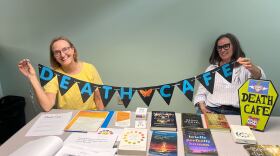-
Much of southern Wisconsin is under an extreme cold watch Jan. 22-24. Here are Milwaukee-area resources to help you stay safe during bitter cold.
-
Milwaukee's health department released its community report identifying five major areas putting Milwaukee residents at higher risk.
NPR stories
WUWM stories
-
A recent American Medical Association study found that physicians on average suffer from depression, anxiety and PTSD at higher rates than the general population.
-
When a baby is born, there’s the option of a birth doula. Now, more people are seeking death doulas to help them prepare for the end of life with clarity and support.
-
Since 1958, a federal program has controlled the invasive sea lamprey population in the Great Lakes. It's been under threat this year by budget cuts from the Trump administration.
-
The City of Milwaukee's sexual and reproductive health clinic at Keenan Health Center is temporarily closed due to staffing shortages.
-
"Spirits Dancing" will highlight the work of Grand Portage Anishinaabe Nation resident and astrophotographer Travis Novitsky.
-
UW-Milwaukee physics and astronomy assistant professor Lia Medeiros explains gravitational waves and the role UWM played in discovering them.
-
Dr. Jim Conway gives an overview of vaccine availability in Wisconsin as we head into the flu season.
-
The event takes planetarium guests on a halloween-themed indoor stargazing journey through the spookiest parts of space on Fridays this October.
-
Over 800 people have removed themselves from the Wisconsin organ donor registry this year. A transplant surgeon and the president of organ donation at Versiti Wisconsin weigh in.
-
Planned Parenthood clinics in Wisconsin will halt abortions Oct. 1. Trump’s tax and spending law includes a provision barring abortion providers from receiving Medicaid reimbursements.



















